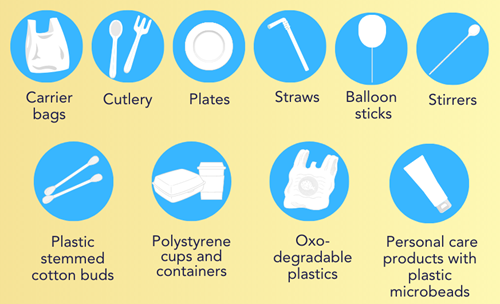
Regarding business and service activities, starting from January 1, 2026, hotels and tourist areas in Hanoi will no longer circulate or use single-use plastic products. These include toothbrushes, razors, cotton swabs, shower caps, and single-use plastic packaging containing toothpaste, shower gel, body lotion, shampoo, and conditioner.
Markets and convenience stores will be prohibited from providing free non-biodegradable plastic bags from January 1, 2027. Starting January 1, 2028, they will also be banned from circulating or using single-use plastic products and non-biodegradable plastic packaging (such as non-biodegradable plastic bags and foam boxes for packaging or containing food), except for products or goods that come with such packaging by default.
In daily activities, governmental agencies, units, organizations, and associations under the city’s administration will stop using single-use plastic products and non-biodegradable plastic packaging from January 1, 2028.
For manufacturing activities, enterprises that use PE or PP plastics in packaging must include at least 20% recycled plastic starting from January 1, 2028, increasing to a minimum of 30% after two years.
Businesses must gradually reduce the production and import of single-use plastic products, non-biodegradable plastic packaging, and products containing microplastics. From January 1, 2031, all such production and importation must cease entirely, except for products manufactured for export purposes.
Hanoi encourages agencies, organizations, and individuals to reduce plastic emissions ahead of the official timeline and to apply best available recycling technologies in plastic waste recycling, in order to benefit from the city and central government’s support and incentive policies.
According to a report from the Hanoi People’s Committee, the city generates over 1,400 tons of plastic waste per day, with more than 60% being single-use plastic and plastic bags. A 2021 survey of 48 supermarkets in Hanoi revealed that more than 100,000 plastic bags are given away for free each day, equivalent to 38 million bags per year. Most of these bags are used only once before being discarded in landfills.
At a workshop for the National Plastic Action Partnership (NPAP) held on July 9, a representative from KPMG cited a World Bank report showing that Vietnam consistently ranks among the top 10 countries for plastic waste leakage. It is estimated that in 2018, Vietnam generated about 3.7 million tons of plastic waste, a figure projected to reach 7.6 million tons by 2030. Of this, only 0.4 million tons were recycled, while the vast majority were burned, dumped, or landfilled.
